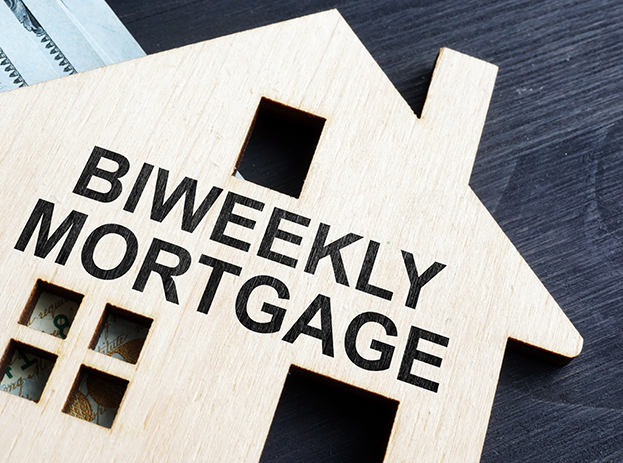Should I pay my mortgage down faster?
If you’ve ever asked yourself, “Should I pay off my mortgage early?” the short answer is yes. While it may be tempting to stretch out the term of your mortgage to keep your payments down, it will cost you more — much more — in the long run. Interest can add up to tens of thousands of dollars over the life of your loan, so paying off a mortgage early is a smart financial choice.
But you don’t have to win the lottery or live on a shoestring budget to do it. Here are a few simple ways to pay off your mortgage faster:
Make accelerated bi-weekly payments

Instead of paying your mortgage every month, split the monthly mortgage amount in half and pay every two weeks. This is referred to as “accelerated” bi-weekly payments. You end up making a total of 26 payments per year — or two extra payments — in a 52-week period.

That means you’re putting one extra monthly payment toward your mortgage each year, without even noticing it. That 13th-month payment is called the ‘accelerant,’ because it allows you to pay off your mortgage faster and lower the amount of interest you pay.
This is different than a “regular” bi-weekly payment, where the monthly mortgage payment is multiplied by 12 months (to get total annual payment) and then divided by 26 to come up with “regular” bi-weekly payment.
Example:
$1000 per month x 12
= $12,000 ÷ 26
= $461.54 “regular” bi-weekly payment
Round up your payments
Whether you’re paying bi-weekly or monthly, round up your payments — so instead of paying $488 every two weeks, round it up to $500. You’ll barely notice the extra $12, but those small amounts add up over time and could shave years off the amortization schedule.
This extra portion of the mortgage payment can be started, stopped, re-started, increased, or decreased. This gives you great flexibility if your financial affairs and your cash flow change over time.
Note that the round-up amount is considered to be a principal payment. It will go towards the maximum amount that you are allowed to pre-pay on your mortgage every year without incurring any pre-payment penalties. More on this in the next section…
Make an annual lump-sum payment
Most closed mortgages allow you to make at least one extra lump-sum mortgage payment annually, without penalty. And many financial institutions allow you to make multiple lump-sum payments throughout the year — as long as you do not exceed the maximum amount you are able to pre-pay on your mortgage without the penalty. In industry speak, this is called a prepayment privilege.

The bonus? It’s applied directly to your principal, which will help with paying off a mortgage early and save on interest.
So where will you get that extra money? One option is to use your tax refund as your annual lump-sum payment. You may even want to consider increasing your RRSP contributions and putting your tax refund directly toward the principal of your mortgage.
Typically, you’re allowed to make a lump-sum payment between 10 to 20 per cent of your mortgage balance, based on your original mortgage amount or the last renewal amount. But once again, remember that if you want to pay more than what you are allowed to pre-pay every year, you’ll end up paying a prepayment penalty.
If you’re unsure how much that maximum amount allowed is, ask your advisor.
Use found money
If you don’t have room in your household budget to increase your payments or make a lump-sum payment, consider using ‘found’ money instead. That could be anything from a bonus at work to birthday money or an inheritance. Since it’s ‘found,’ you weren’t expecting it and it won’t impact your budget.

While you may be tempted to spend found money on something more exciting, such as a vacation, consider that about half the total interest of a typical mortgage accumulates in the first 10 years (because the principal is much higher). The faster you can reduce your loan, the better chance you’ll have of paying off a mortgage early.
Never lower your payments
When it comes time to renew, most people want to negotiate the interest rate. If you’re able to get a lower rate than you had before, then you’ll be in a position to decrease your bi-weekly or monthly payments.
However, if your goal is to pay off the mortgage as fast as possible, don’t decrease your mortgage payment. Instead, keep on paying the same amount you were paying before. You’re already used to it, so it won’t affect your budget, yet you’ll be able to pay off your mortgage earlier.
Refinance a shorter-term mortgage
A straightforward way to reduce the amount of time it takes to repay your loan is to shorten the term of your mortgage. When it comes time to renew, for example, you could refinance to a 15-year mortgage instead of a 20-year mortgage. This would, of course, increase your payments, but you’ll save a whopping amount on interest — and pay off your mortgage five years sooner.
Fixed versus variable
When it comes to choosing a fixed-rate or variable-rate mortgage, it’s not a clear-cut decision. With a variable rate, if interest rates go down, more of your money goes toward your principal — so you’d pay off your mortgage slightly faster. Inversely, if rates go up, it would take slightly longer to pay it off. With a fixed rate, you save if rates continue to rise. Since no one can accurately predict the future, it depends on how much risk you’re willing to take on.

What we can see from the past though, is that variable rate mortgages have been cheaper going as far back as the 1950s right up to today. When it comes to this decision, it has more to do with your level of comfort than the actual rate.
When is paying off a mortgage early the wrong choice?

Paying down your mortgage early isn’t the best decision for everyone. If you have high credit card debt, no retirement savings or no emergency funds, you may be better off attending to those financial concerns first.
Also, if you run a home-based business, a portion of your mortgage interest is tax-deductible so you may not be incented to pay it off faster. The same can be said of a property that’s both a home and investment property. If you’re unsure what to do, discuss this with your financial advisor to get advice for your specific situation.
Consider your options
It’s easy to ‘set it and forget it’ when it comes to your mortgage, but by paying attention to interest rates, you’ll have a better sense of your options going forward. Take some time to investigate your options by using tools such as this ACU mortgage calculator, which can give you an idea of how much you can afford to borrow while estimating your potential mortgage payments.
Paying off a mortgage early is achievable if you follow even a couple of these strategies. You’ll significantly reduce the term of your mortgage while saving thousands of dollars in interest over the life of your loan — all without having to dramatically change your lifestyle or household budget.
Up Next
Sustainability: How ACU is turning words into action
A hand holding a seedling
For ACU, Pride radiates outward
“I’ve always wanted to instill a change in the world for the better,” says Cristina McCourt, Financial Account Manager Trainee and member of the ACU Pride Committee, an employee-led resource…
Royal Aviation Museum travels to its final destination—with ACU’s help
A stone’s throw from the main terminal of Winnipeg Richardson International Airport you’ll find one of Canada’s hidden gems, where the airplanes are a little more exciting than your typical…




